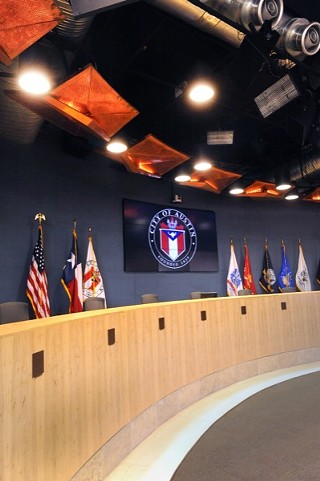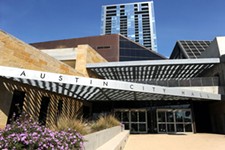City Looks to Outside Counsel
Repeal of land code 'not a black and white legal issue'
By Amy Smith, 11:02AM, Mon. Mar. 25, 2013
[Updated from Sunday night's post]
Outside legal counsel has been retained to help the City Council wade through a highly controversial staff proposal that would repeal parts of the city’s development rules enacted in 1997 to protect water quality.
The Chronicle learned this evening that Scott, Douglass & McConnico lawyers Sara Wilder Clark and Casey Dobson, who has represented the city in many land-use disputes, has been asked to review the staff proposal, meet with attorneys on opposing sides of the issue, and weigh differing legal interpretations of the city’s Project Duration Ordinance, long a burr under the saddle of developers.
City Attorney Karen Kennard notified the mayor and City Council in a memo Sunday evening.
An outside firm’s sudden entry into the fray follows last week’s dramatic hearing that included four hours of sharply divided testimony from a wide range of environmental activists on one side and real estate activists on the other.
By 11:15pm that night, the Council decided it wasn't prepared to take the “safer” route by rescinding city rules that have been in place for more than 15 years. The rules were enacted as a means of protecting water quality in the Barton Springs Zone of the Edwards Aquifer. Only Mayor Lee Leffingwell was prepared to move the ball forward on the repeal; he voted against the postponement saying it was clear in his mind, based on an attorney general’s opinion, staff recommendations, and other legal arguments, that the city was in violation of state law.
The pressure to rewrite the city ordinance has been building since December, when state Attorney General Greg Abbott issued an opinion that concluded the city ordinance conflicts with the state’s Chapter 245 law, which provides much greater leeway for “grandfathered” projects to develop under older, perhaps weaker, local regulations. (The 1995 law was inadvertently rescinded in 1997 and reenacted in 1999. Before then, however, the city had adopted its own protective measures.) The AG opinion is nonbinding, but it added muscle to a push by the Real Estate Council of Austin to upend the city’s grip on development projects deemed “expired” after three to five years.
Adding to the fear factor at City Hall is proposed legislation filed by Austin Rep. Paul Workman, a commercial contractor and former RECA board member, which threatens to undo the city’s ordinance if the city doesn’t do it first.
After a one-week delay, Council is scheduled Thursday to return to the question of whether to level the city’s “grandfathering” regulations in an attempt to fend off a legislative strike and possible litigation from landholders (Item No. 19 on Council's agenda).
"I know I have asked Casey and Sara to undertake a very large project in a very short period of time," Kennard wrote in her memo to Council, "but I believe they will be able to successfully synthesize the volume of information involved and provide a well-reasoned legal opinion to you at Thursday's city council meeting."
Save Our Springs Alliance director Bill Bunch says he doesn’t believe a week is enough time for Council to have all the facts it needs before potentially opening the door to projects that would be allowed to build under old land regs. He said he and fellow attorney Brad Rockwell are scheduled to meet Monday afternoon with the city's newly retained outside counsel.
If the delay gave environmentalists some measure of hope, the extra breathing room left RECA members frustrated. Attorney lobbyist Nikelle Meade, speaking as RECA’s president, expressed her dismay over Council’s lack of action. “The question before the city is whether its laws are consistent with the state law and what to do about it if they aren’t,” she said.
Many of those who spoke at last week’s hearing are veterans of Austin’s decades-old war between environmentalists and developers. Former SOS Alliance board chair Robin Rather, who in 1999 helped broker a widely acclaimed peace agreement between the two warring parties (in which RECA reluctantly agreed to the existing project duration rules), urged Council members against going limp in the face of a Lege threat. She reminded them that state Sen. Kirk Watson, who served as mayor during much of the enviro-development turmoil, was willing to fight to defend the city's water protection laws. "The reason this agreement happened is that he made it happen," she said.
Several proponents of the code change used the words “black and white” to describe what to them is a no-brainer: either the city is in alignment with state law, or it’s not.
But Council Members Laura Morrison and Kathie Tovo argued that there were still too many gray areas to consider before making an irreversible decision on established community values. “The only thing that is black and white for me is that this is not a black and white legal issue,” Morrison said. “It would be a grave misstep if we repealed [the code] right now.”
CM Bill Spelman suggested punting the issue for a week to allow time for staff to find a representative sampling of 20-40 development cases that would be affected by a repeal of the city’s ordinance. "It seems to me that when we see the 20 to 40 cases, we'll be scratching our heads and saying, 'Is this all there is to it?'" he said.
But there may be much more to come. At the Capitol, meanwhile, House committees are scheduled to hear testimony this week on legislation that would take an axe to local tree protection ordinances. House Bill 1858 (Workman) is set for a hearing Tuesday before the Business & Industry Committee, while HB 1377 (Rep. Lois Kolkhorst) is set to be heard Wednesday by Urban Affairs.
Got something to say on the subject? Send a letter to the editor.
A note to readers: Bold and uncensored, The Austin Chronicle has been Austin’s independent news source for over 40 years, expressing the community’s political and environmental concerns and supporting its active cultural scene. Now more than ever, we need your support to continue supplying Austin with independent, free press. If real news is important to you, please consider making a donation of $5, $10 or whatever you can afford, to help keep our journalism on stands.
Maggie Quinlan, June 13, 2022
Austin Sanders, Aug. 13, 2021
Nov. 28, 2014
City Council, development, Real Estate Council of Austin, Save Our Springs Alliance, Legislature, Lege, Edwards Aquifer











